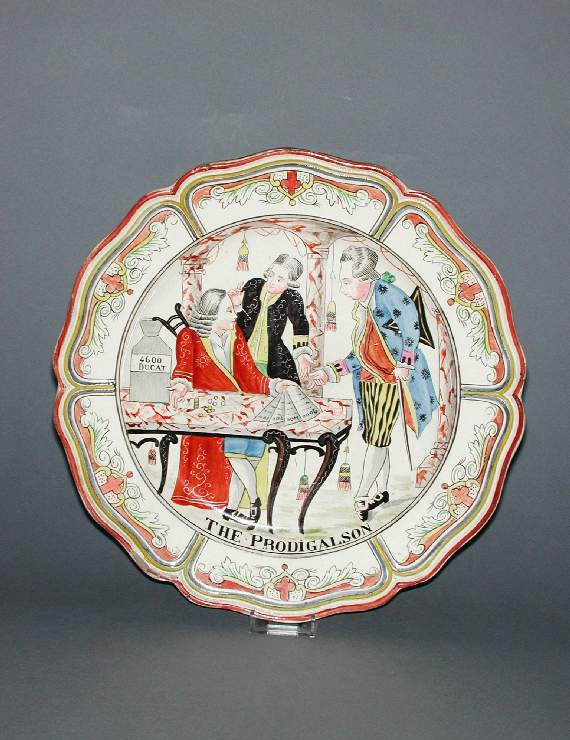Current Location: In storage
Titles
The Prodigal Son
Maker(s)
Factory:
Unidentified Pottery
Decorator:
unidentified enameller
Entities
Categories
Description
Lead-glazed creamware decorated in enamels with scene from the parable of the Prodigal Son.
Pale cream-coloured earthenware covered in a clear lead-glaze and painted overglaze with coloured enamels. The plate has a six-lobed wavy rim bordered by a double moulded line. Each lobe is painted with red, yellow and blue bands around the edge and yellow scrolls, green leaves and a red cross in the centre. The scene in the middle of the plate shows the Prodigal Son and his brother receiving their patrimony from their father. The father is sat at a table on which is a jar labelled ‘4600 DUCATS’ and a pile of coins. He holds bills labelled ‘2000’, ‘400’, ‘300’ and ‘100’. The two brothers stand to his left and reach out to take the money. In the background, there are arches and columns, painted in imitation of red-veined marble; the tabletop also displays this marble effect. Beneath the scene is the title: ‘THE PRODIGAL SON’. Marked on the based with an impressed lozenge.
Notes
History note: Provenance unidentified before Mr Stoner, London, who sold as part of set of six plates (C.1184-1928 – C.1184E-1928) for £26 on 13 January 1919 to Dr J.W.L. Glaisher, FRS, Trinity College, Cambridge
Legal notes
Dr J.W.L. Glaisher Bequest
Measurements and weight
Diameter: 25.1 cm
Height: 2.7 cm
Acquisition and important dates
Method of acquisition: Bequeathed
(1928-12-07)
by
Glaisher, J. W. L., Dr
Note
Although the plate itself is of English manufacture, the overglaze painted decoration is thought to be Dutch. The Prodigal Son scenes on the plates are a common motif on Dutch decorated English creamware, often appearing with Dutch captions rather than the English ones. Some of scenes from this set of plates appear with different English captions on three stylistically comparable plates in the Metropolitan Museum in New York (1971.180.199-201).
The lozenge mark on the plate is listed in Godden’s ‘Encyclopaedia of British Pottery and Porcelain Marks’ as being a workman’s mark used at the Swansea pottery c.1800-10 but Donald Towner suggests it also appears on 18th-century creamware, sometimes in conjunction with Wedgwood marks.
This plate belongs to a set of six (C.1184-1928 - C.1184E-1928) which illustrates the parable of the Prodigal Son. The scenes on the plates are derived from Richard Purcell’s prints, published in London in that early 1750s, after a series of paintings of the Prodigal Son by the French artist Sebastien le Clerc. This plate shows the beginning of the parable: the father giving his patrimony to the Prodigal Son and his brother.
People, subjects and objects depicted
Materials used in production
clear
Lead-glaze
cream-coloured
Earthenware
Enamels
Techniques used in production
Press-moulding
: Press-moulded cream-coloured earthenware covered in a clear lead-glaze and painted overglaze in coloured enamels
Painting overglaze
Lead-glazing
Inscription or legends present
- Text: THE PRODIGAL SON
- Location: Below image in centre of plate
- Method of creation: Painted overglaze in black enamel
- Type: Inscription
- Text: 4600 DUCAT
- Location: On jar on table
- Method of creation: Painted overglaze in black enamel
- Type: Inscription
- Text: 2000
- Location: On bill
- Method of creation: Painted overglaze in black enamel
- Type: Inscription
- Text: 400
- Location: On bill
- Method of creation: Painted overglaze in black enamel
- Type: Inscription
- Text: 300
- Location: On bill
- Method of creation: Painted overglaze in black enamel
- Type: Inscription
- Text: 100
- Location: On bill
- Method of creation: Painted overglaze in black enamel
- Type: Inscription
Inscription present: lozenge
- Location: On base
- Method of creation: Impressed
- Type: Mark
Inscription present: circular, stick-on paper label with border printed in black with ‘J. W. L. GLAISHER COLLECTION’
- Text: 4610(4)
- Location: On base
- Method of creation: Handwritten in black ink
- Type: Label
References and bibliographic entries
Identification numbers
Accession number: C.1184-1928
Primary reference Number: 71471
Old catalogue number: 4610(4)
Stable URI
Audit data
Created: Saturday 6 August 2011
Updated: Monday 29 April 2024
Last processed: Tuesday 15 July 2025
Associated departments & institutions
Owner or interested party:
The Fitzwilliam Museum
Associated department:
Applied Arts




